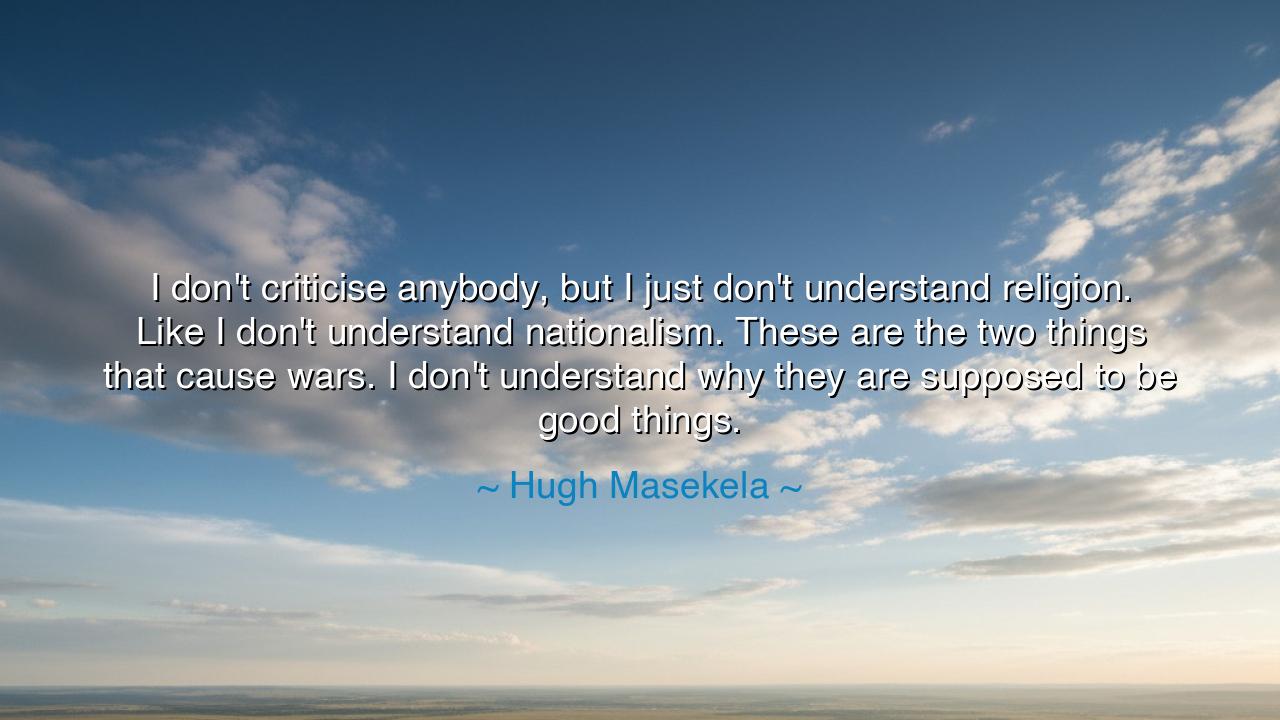
I don't criticise anybody, but I just don't understand religion.
I don't criticise anybody, but I just don't understand religion. Like I don't understand nationalism. These are the two things that cause wars. I don't understand why they are supposed to be good things.






In the sacred scrolls of human history, we see written a tale of struggle, division, and conflict. Hugh Masekela, in his poignant reflection, speaks to the heart of this story with his words: "I don't criticise anybody, but I just don't understand religion. Like I don't understand nationalism. These are the two things that cause wars. I don't understand why they are supposed to be good things." Here, Masekela raises a question that echoes through the chambers of time, one that confronts us with the paradox of human belief and identity. Religion and nationalism—two of the most powerful forces in human history—have long been sources of division and conflict, despite their supposed nobility. Masekela’s words invite us to examine how these constructs, which are meant to unite, have instead often torn the world apart.
To understand Masekela’s message, we must first look to the origins of religion and nationalism, two concepts that have shaped the course of human civilization. Religion, in its most ancient form, emerged as a way for human beings to seek meaning in the face of the unknown. It was a path to truth, a guide to morality, and a bridge between the human and the divine. Yet, over time, as it became institutionalized, it often evolved into something very different—something that could be manipulated to control, divide, and oppress. Nationalism, too, arose from the human need for identity and belonging. But it, too, has often been twisted, turning into an ideology that separates people into us and them, leading to countless conflicts in the name of pride and loyalty to one's nation.
Consider the tragic story of the Thirty Years' War (1618–1648), a conflict that pitted Catholics against Protestants across Europe, driven by a desire to enforce religious uniformity. What began as a religious dispute escalated into a devastating war that caused untold suffering and loss of life. In the end, religion—intended to bring people closer to God—became a weapon of division, tearing apart communities, families, and entire regions. Hugh Masekela’s reflection on religion as a cause of war resonates deeply in this context. He does not criticize religion itself, but rather its use as a tool of control, used to separate and subjugate rather than unite and heal.
Similarly, nationalism has often been the driving force behind some of the most violent conflicts in human history. The First World War, for instance, was sparked by the assassination of Archduke Franz Ferdinand, an event that set off a chain reaction driven by nationalistic pride and territorial disputes. Nations, driven by a desire to assert their dominance or protect their sovereignty, plunged the world into a war that claimed millions of lives. Nationalism, much like religion, is meant to unite people under a common identity, but when taken to extremes, it becomes a source of division and hostility, turning neighbors into enemies, and turning patriotism into aggression.
Masekela’s words cut to the heart of the paradox of these two forces. On one hand, they are meant to bring people together, to provide a sense of purpose, and to create a foundation for morality and community. On the other hand, when manipulated by those in power, they become the very forces that divide and destroy. The lesson from Masekela’s insight is a powerful one: the ideals that are meant to elevate humanity—whether through religion or nationalism—can become the very forces that pull us apart, that blind us to our shared humanity, and that cloud our ability to see others as equals.
As we reflect on Masekela’s words, we are reminded of the importance of self-awareness and critical thought. We must not blindly follow ideologies or belief systems that promise unity, but instead question how they are used and who benefits from them. True unity comes not from the imposition of uniformity, but from the recognition of our shared humanity. Whether it is religion, nationalism, or any other system of belief, we must ask: does it bring people together, or does it create divisions and conflicts? Does it inspire peace, or does it breed hatred?
The lesson we can take from Masekela’s profound reflection is one of responsibility—the responsibility to examine the forces that shape our identities, to look beyond labels and boundaries, and to strive for a world where love, compassion, and understanding transcend the divisions created by religion, nationality, and ideology. Let us move beyond the dogma and the nationalism that separate us and embrace a more universal sense of unity, grounded in the recognition that, regardless of our differences, we are all part of the same human family.
In our own lives, we can take Masekela’s message to heart by challenging the systems that seek to divide us and instead, embracing the shared values that unite us all. Whether in our communities, in our relationships, or in our broader worldview, let us focus on the commonalities that bind us rather than the differences that separate us. Let us create a world where religion and nationalism are not forces of war, but paths to peace and cooperation, where we are free to honor our differences without allowing them to become sources of conflict and destruction.






AAdministratorAdministrator
Welcome, honored guests. Please leave a comment, we will respond soon